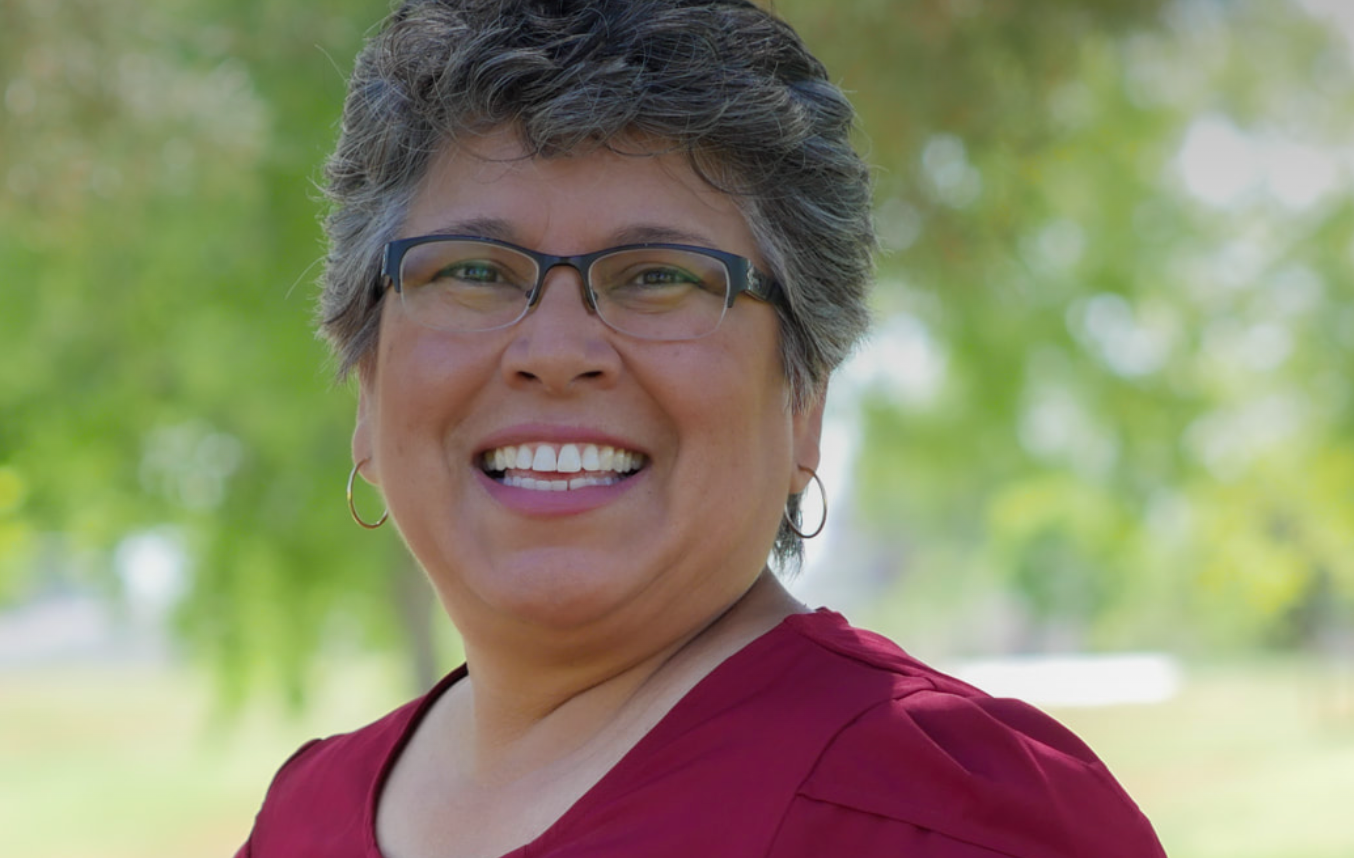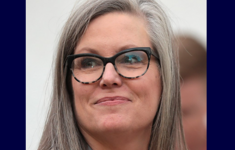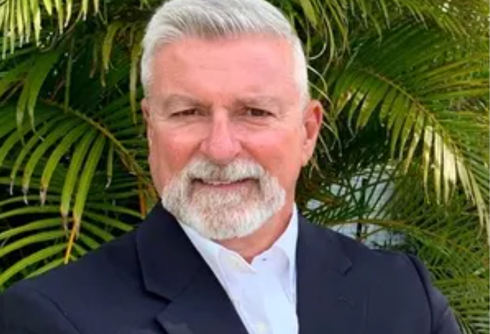State Rep. Patty Contreras (D) has served the people of Arizona for over three decades, first as a civil servant in Phoenix, where she was a program manager in human services and parks and recreation, and then as an elected official. In 2022, she was elected to serve the constituents of Legislative District 12 just south of Tempe, home to her alma mater, Arizona State University. She’s one of the first out lesbians elected to the Arizona House, and she’s running for reelection in 2024.
LGBTQ Nation spoke with Contreras from her office just minutes after she left a signing ceremony for a bill addressing assisted living and memory care facilities with Gov. Katie Hobbs (D). Contreras has been passionate about elder care since she first joined city government to work with seniors almost 40 years ago.
Related:
Arizona governor vetoes bill seeking to erase trans folks from public life
“As I have said time and again, I will not sign legislation that attacks Arizonans,” declared Gov. Katie Hobbs.
LGBTQ NATION: In February, Arizona Republicans tried to put a measure on the November ballot that would force teachers to misgender trans students and ban trans kids from using the bathroom aligned with their identity. It was defeated after one Republican senator broke ranks and voted against it. Could you describe the reaction in the State House to that vote? Were some Republicans — known in Arizona for a deep libertarian streak — actually relieved?
Your LGBTQ+ guide to Election 2024
Stay ahead of the 2024 Election with our newsletter that covers candidates, issues, and perspectives that matter.
SEN. PATTY CONTRERAS: Were they relieved? No. These are just more culture war talking points that the Republicans want to throw out there to the community to make people scared and hurt people, in our trans community, especially.
Are Republicans in the Arizona legislature a monolith? Are there Republicans who feel like they’re forced to go along with bills like these, but in their hearts, they’re not really supportive?
I haven’t talked to any that counter the arguments against gays and trans people. If they do, they don’t say anything out loud. They haven’t said anything to me, and I don’t think any of the other representatives have heard anything from any of them. They’re in lockstep and march to the orders of whoever’s giving them.
You co-sponsored a bill in 2023 that would have overturned Arizona’s trans student athlete ban. How widespread is opposition to trans girls playing on teams that align with their identity in their own communities?
I really can’t speak to their districts, but I have to believe there are a lot of Republicans that fall for that whole idea, talking about, “There’s men in the women’s restrooms and men in the women’s showers!” It’s like, these aren’t men, these are trans girls, you know? And even if that, there are very few of them. It’s not like there are locker rooms that are rampant with trans girls. There are only, like, 12 students over the course of 20 years that have ever come out and wanted to participate as a trans athlete. So it’s crazy.
Abortion access is the headline in Arizona right now. Last week, the Arizona Supreme Court ruled it will let the 160-year-old territorial “zombie” ban on abortion take effect, while out Attorney General Kris Mayes says she won’t prosecute any cases under that law. What should we look for regarding abortion in Arizona at this moment?
We have a 15-week ban right now in Arizona We have that 1864 territorial abortion decision, as well. But we also have over 500,000 signatures on a citizen initiative right now that would allow abortion access up to fetal viability. 90% of Arizonans are in favor of abortion access. Young people are very concerned about this. So it just seems crazy that they’re trying to take us back to a time when we weren’t even a state and say that we can’t have that kind of healthcare. This will be on the November ballot, and it’ll bring out the voters.
If 90% of Arizonans don’t want to be told what to do when it comes to abortion access, why doesn’t that translate to giving folks room to be transgender?
That’s a tough one. I think people are just afraid. It’s funny, I talked to a friend of mine the other day. She’s trans, and she says folks are so scared because of a lack of understanding, a lack of wanting to open up their minds to the fact that there’s a whole spectrum of sexuality and gender identification.
It’s such a close-minded perspective to say, you know, “Only men and women!” which is one of the bills that we heard last week, what they call the Women’s Bill of Rights. “We’re gonna only have men and boys and women and girls. We can’t have anything in between – nonbinary, trans, gender nonconforming, nothing like that.” So, again, it’s just culture war-type things, right-wing talking points. They just don’t want to open up their minds to the whole idea that there’s a spectrum of people, and we’ve been here throughout history. It’s not like it’s anything new.
What’s the reasoning behind your support for the right to choose to end a pregnancy?
Well, I’m a woman. And I believe I should have the right to make decisions for my own body. And I’m not going to give that right away to the government or to other people to tell me what I can and can’t do with my body.
Many Latin American immigrants’ first jobs in the US are as farm workers, including members of your own family. As they have kids, how important is public education in helping those families put down roots and integrate into their communities?
Immigrants coming here just want better lives for their families, and education is so important to make sure that they can get better jobs down the road so they can support their family, so they can buy a home. My family did that. My great-grandparents came across from Mexico during the Mexican Revolution, trying to get away from the fighting and the killing that was happening then. They started working in the mines, did some picking of cotton, picking of oranges and other citrus fruits, and we’ve reaped the benefits of that. Me and six of my siblings have graduated from ASU (Arizona State University), and we need to support for folks to make sure that they can get a full education and go where they want to go and do what they want to do with their lives.
All things being equal, do you think life was harder for those immigrant families then, or is it harder now?
I think it was easier then to get citizenship. I think now there are a lot of hurdles to citizenship. I think it’s harder. It takes years and years and years now to go through that process. There were a few waves in history where they needed workers, so they allowed the folks in a lot easier than they do now.
You’re the second oldest of eight kids in your family. What’s the age spread? And did you ever field a baseball team with your mom or dad?
(Laughing) Yeah, so there was 10 years between all eight of us. So, rapid succession. I did play baseball with my brothers in little league. My dad was a big-time coach, and my brother played, I played, my other brother played. It was a lot of fun. I kind of got in right when Title IX gave girls equal access to sports and the first little league teams were allowing girls in.
You were the first in your family to graduate from college and as you said, five of your siblings followed you to ASU, and three completed master’s degrees. Why did your generation pursue higher education when your parents and grandparents didn’t? Or was everyone just following in their big sister’s footsteps?
Well, yes, they followed in the big sister’s footsteps. But, my mom got married when she was 18. My dad had been in the military, and he was working a laborer job when he married my mom. And also, I just don’t think there was opportunity for them to go to college. None of her siblings went to college. None of my dad’s siblings went to college. Going to college was something that they didn’t really impress on us, but it was something that we saw as a way out of our small town and to become professional and all. We wanted to just improve our lives and make the family proud.
Do you all bond over ASU football?
Football is the big rallying point. We all get together and cheer on the Devils. We used to have season tickets together, but now there’s only a few of us that live here in the area, so now it’s on TV and texting back forth.
How did you and your wife meet, and who proposed to whom?
Oh, wow. So a friend of mine that I’ve known since college had invited her massage therapist out to dinner one day and I was just getting done with golf, and Kim and Cathy, they’re like, “Oh, we’re gonna go have dinner with Ange, you want to come with us?” I thought, oh no, I look terrible. I had a hat on, I was just kind of grody looking from playing golf in the summertime. But they finally convinced me to go to dinner with them. And so I met her there.
A few years later, we were in Escondido, taking a train to San Diego, and we passed by what I thought looked like a courthouse. And it was kind of in that timeframe in California around 2008 where they still allowed same-sex marriages – because they allowed them, then they disallowed it, and then it became national. So, we’re passing the courthouse, and I said to her, this is my proposal: “We should get married!”
Pretty casual.
Pretty casual! It was pretty funny. And we went to the courthouse, and we’re like, we’re starving. It’s like, oh, should we go? No, we should wait, no, we should go. No, we should wait. So we decided to hang out. And when we’re just getting ready to leave because we’re so hungry, they call us up and we were able to get married. And then we went to lunch (laughing).
Your dad was a Korean War vet, and you’ve called yourself very patriotic. Do you think that compulsory national service — in the armed services or teaching or some other way to contribute to society could be positive for young people and for the country?
Well, I don’t want to say the service because that’ll make everybody mad at me. But I do I think we’ve lost a sense of what our country is about. I think we’ve lost the sense of being involved in our communities. So yes, if we were to have something that was a two-year stint helping the poor, or two years serving lunches — AmeriCorps-type stuff, I think would just really help people understand where they are and how they can really make contributions to their communities.
I used to work with senior citizens 30, 40 years ago, and people of that generation, the silent generation, were very much community-minded, and they would volunteer for everything. They wanted to get involved. They really had a sense of community. With newer generations, I guess, we’re seeing less and less of that wanting to give back. It’s more “Me, me, me,” instead of “Let’s take care of us.” And I really would like to see some of that come back.
Arizona has been ground zero for election deniers since 2020. From your vantage point in the legislature, is that fever breaking, or is it as bad as ever?
We have a few cult followers who just don’t want to understand that elections have been done, basically, the same way for many, many years, and there’s never been an issue until Donald Trump. And that’s the common denominator. There was no election denial before that, at least not as rampant as it has been. Even failing lawsuit after lawsuit after lawsuit, they’re still continuing to believe in these crazy election denial ideas. They want to go back to precinct voting, they want to go to a hand count. How are we going to hand count two, three million people for same-day voting? I mean, these types of things are just ridiculous. It’s not going to work.
I’ve done election protection. I’ve done poll-watching. I’ve seen how efficient they can be. I’ve seen some issues, but they always take care of them. Go check it out. Go check out the Recorder’s Office, they’ll give you a tour. And they’re saying, “Oh, they’ll just show us what they want to see. It’s all rigged.” I just don’t understand it.
Have you witnessed intimidation or other shenanigans yourself?
At the last election, I was at a polling station and a gentleman came in with a sidearm. Everybody was like, “Oh, he has a gun! He has a gun!” The head of that particular voting center handled it well and just asked him to leave, and the guy was actually pretty good about leaving. A little huffy, but, you know, that could intimidate people. That could have scared people off. But people stayed in line, which I was grateful for. We don’t need people with firearms. We don’t need cops around.
Politico reported last week that Attorney General Mayes appears to be nearing a decision on whether to ask a grand jury to issue indictments in a probe of Trump fake electors. That follows Attorneys General Dana Nessel in Michigan and Aaron Ford in Nevada, and Fulton County, Georgia District Attorney Fannie Willis all pursuing charges against fake electors. What can you share about Mayes’ case?
I can’t share anything about the case, but I know Kris Mayes and bully for her. Those folks were trying to run an insurrection, an organized insurrection to try and take over the government, and they need to be held accountable.
Arizona Congressmen Paul Gosar and Andy Biggs have been called to testify in her probe, as well. What do you think those two have coming to them?
Well, I guess they’re claiming some sort of congressional immunity. I have no idea what that is. But regardless of that, I think they should be prosecuted to the fullest extent possible. You shouldn’t be able to get away with trying to overthrow the government. And that’s essentially what it felt like to me when I watched on January 6 and was just in tears.
I have some hypotheticals. Arizona Republican stalwarts Barry Goldwater, John McCain, and Sandra Day O’Connor are at the pearly gates when Donald Trump arrives. Who turns him away and why?
(Laughing) Oh, I would think Barry Goldwater, our elder statesman. He would do it. He’d be the one that would just say, “You don’t belong here. Go away.”
Who would win in a cage fight? Kyrsten Sinema or Meghan McCain?
Oh, no! I think — Kyrsten Sinema or — I think Meghan McCain, actually. She’s a tough cookie.
You’re on a date with Kari Lake.
(Laughing) I’m married.
I know you’re married. But let’s just say you’re out with the likely Republican nominee to replace Sinema in the Senate. Are you more worried that, a) she’ll secretly record your conversation? Or b) you’ll wake up with a hangover and an unnaturally smooth forehead?
(Laughing) I’d be afraid she’s recording everything. She’s a wackadoodle. I’m probably gonna hear about that one later on, but she is crazy.
What’s the best thing about representing your constituents in Legislative District 12?
We have a very diverse group of folks in my district. I mean, they’re active. They’re involved. They’re engaged. I have a monthly open house at one of the local coffee shops, and I see it then and in my office and at other events. They know that I’m accessible, and they are willing to give me a call or come and visit or send me an email. They’re very engaged. They have to be the best constituents in the state.
















